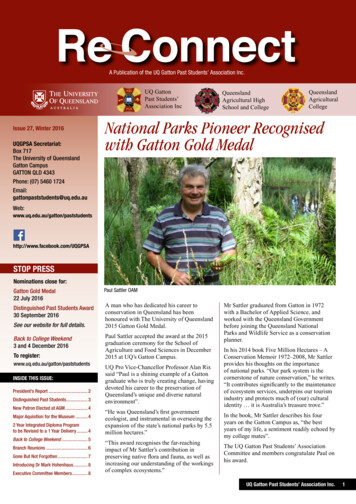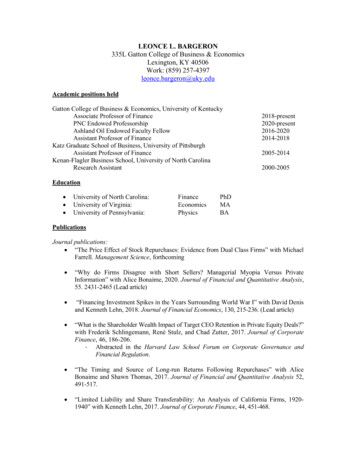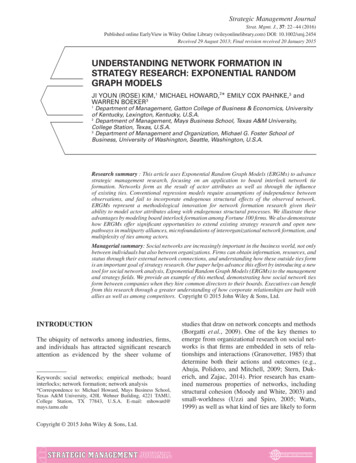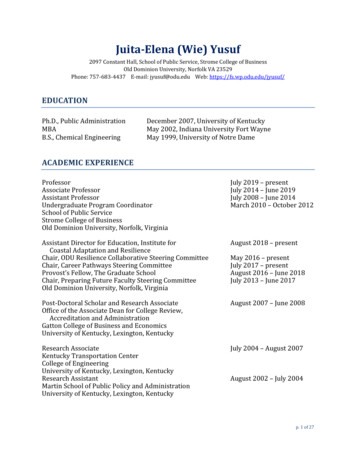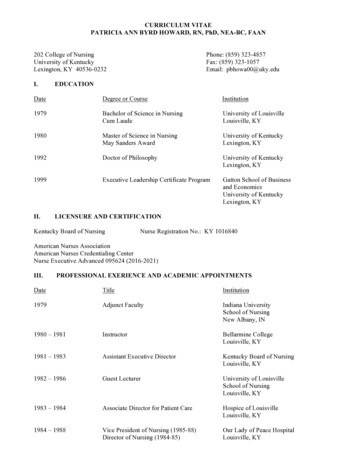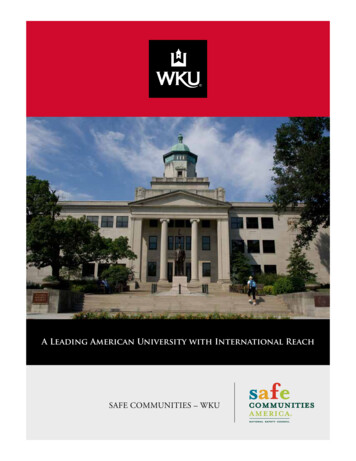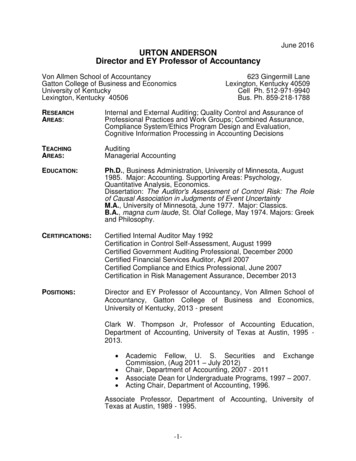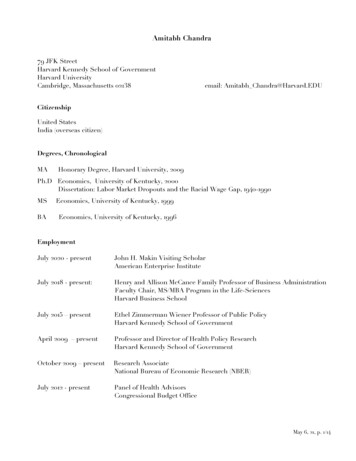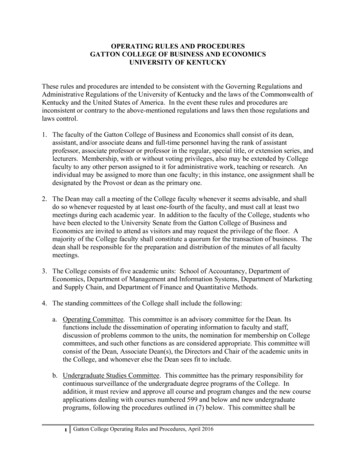
Transcription
OPERATING RULES AND PROCEDURESGATTON COLLEGE OF BUSINESS AND ECONOMICSUNIVERSITY OF KENTUCKYThese rules and procedures are intended to be consistent with the Governing Regulations andAdministrative Regulations of the University of Kentucky and the laws of the Commonwealth ofKentucky and the United States of America. In the event these rules and procedures areinconsistent or contrary to the above-mentioned regulations and laws then those regulations andlaws control.1. The faculty of the Gatton College of Business and Economics shall consist of its dean,assistant, and/or associate deans and full-time personnel having the rank of assistantprofessor, associate professor or professor in the regular, special title, or extension series, andlecturers. Membership, with or without voting privileges, also may be extended by Collegefaculty to any other person assigned to it for administrative work, teaching or research. Anindividual may be assigned to more than one faculty; in this instance, one assignment shall bedesignated by the Provost or dean as the primary one.2. The Dean may call a meeting of the College faculty whenever it seems advisable, and shalldo so whenever requested by at least one-fourth of the faculty, and must call at least twomeetings during each academic year. In addition to the faculty of the College, students whohave been elected to the University Senate from the Gatton College of Business andEconomics are invited to attend as visitors and may request the privilege of the floor. Amajority of the College faculty shall constitute a quorum for the transaction of business. Thedean shall be responsible for the preparation and distribution of the minutes of all facultymeetings.3. The College consists of five academic units: School of Accountancy, Department ofEconomics, Department of Management and Information Systems, Department of Marketingand Supply Chain, and Department of Finance and Quantitative Methods.4. The standing committees of the College shall include the following:a. Operating Committee. This committee is an advisory committee for the Dean. Itsfunctions include the dissemination of operating information to faculty and staff,discussion of problems common to the units, the nomination for membership on Collegecommittees, and such other functions as are considered appropriate. This committee willconsist of the Dean, Associate Dean(s), the Directors and Chair of the academic units inthe College, and whomever else the Dean sees fit to include.b. Undergraduate Studies Committee. This committee has the primary responsibility forcontinuous surveillance of the undergraduate degree programs of the College. Inaddition, it must review and approve all course and program changes and the new courseapplications dealing with courses numbered 599 and below and new undergraduateprograms, following the procedures outlined in (7) below. This committee shall beGatton College Operating Rules and Procedures, April 2016
chaired by the Associate Dean for Undergraduate Affairs, and include the Director ofUndergraduate Studies in each academic unit and an undergraduate studentrepresentative.c. MBA Policy Committee. This committee’s responsibilities include those issues relevantto the administration and operation of the MBA program, including admission,curriculum and placement. The committee must review and approve all course andprogram changes and new course applications dealing with the MBA program followingthe procedures outlined in (8) below. The committee serves the same responsibility forthe MBA program, as does the Graduate Committee for all other graduate programs inthe Gatton College. This committee shall be chaired by the Director of Graduate Studieswith responsibilities for the MBA program and include a representative from each of theacademic units in the College and a student representative. Appointments will be madeby the Director of Graduate Studies in consultation with the Dean and the academic unitheads. Terms of the appointments will be for one year. Reappointment for additionalone-year terms is possible.d. Graduate Studies Committee for the PhD in Business and the MS in Accounting. Thecommittee’s responsibilities include continuous surveillance and improvement of thePhD in Business Administration and the MS in Accounting programs. This committeemust review and approve all course and program changes and new course applicationsdealing with courses in these programs numbered 400G and 500 and above and newgraduate programs, following the procedures outlined in (8) below. This committee shallbe chaired by the Director of Graduate Studies for the PhD in Business Administrationand MS in Accounting, and include the Associate Dean of Academic Programs, amember of the graduate faculty from each academic unit in the college exceptEconomics, and a graduate student representative. Appointments shall be made by theDirector of Graduate Studies for the PhD in Business and MA in Accounting inconsultation with the Dean and the academic unit heads.e. Graduate Studies Committee for the PhD and MS in Economics. The committee’sresponsibilities include continuous surveillance and improvement of the PhD and MS inEconomics programs. This committee must review and approve all course and programchanges and new course applications dealing with courses in the graduate program inEconomics numbered 400G and 500 and above and new graduate programs, followingthe procedures outlined in (8) below. This committee shall be chaired by the Director ofGraduate Studies for the PhD in Economics, and include the Associate Dean of AcademicPrograms, selected members of the graduate faculty from the Economics Department,and a graduate student representative. Appointments shall be made by the Director ofGraduate Studies for the PhD in Economics in consultation with the Dean and the Chairof the Economics Department.f. Faculty Advisory Committee on Promotion and Tenure: The committee is an advisorycommittee to the Dean. In line with the University’s Administrative Regulations, theDean will obtain a written recommendation from this committee whenever an assistant,associate or full professor in considered for promotion and/or tenure. The committeeGatton College Operating Rules and Procedures, April 2016
shall consist of a tenured full or associate professor from each academic unit in theCollege. The Dean, Associate Dean(s) and academic unit heads are not eligible formembership. Faculty members from each academic unit will elect their representative tothe committee. If an associate professor is chosen to serve on the committee, then theunit will also choose a full professor to serve as an alternate for all promotions and/orappointments to full professor. As stated in the University Administrative Regulations amember of the advisory committee is excluded from any participation in the committee’sconsideration of a recommendation initiating from the academic unit in which the facultymember holds a primary academic appointment.g. Diversity Advisory Committee. This committee has the responsibility to provide ongoingreview of issues of diversity and multiculturalism affecting the college, to advise theDean accordingly and to facilitate the implementation of diversity goals set by theadministration with regard to faculty, staff and students. The committee is chaired by anAssociate Dean for Faculty, Administration and Research of the College and consists of afaculty member from each of the academic units in the College, an appointee from eachof the Exempt and Non Exempt Staff and a selected student representative from bothGraduate and Undergraduate programs in the Gatton College of Business and Economics.h. Strategic Planning and Quality Improvement Committee. This committee is responsiblefor strategic planning, monitoring data necessary to gauge success in achieving strategicobjectives, revising plans as needed and updating the plan on an annual basis, andassisting the Dean in preparing an annual report. More specific responsibilities include:1) developing short and long-term strategic plans for the College with budgetimplications, 2) reviewing, developing and overseeing the implementation of quantitativeand qualitative measures for use in program assessment, 3) incorporating data assessmentresults into the strategic planning process and making recommendations for programmodifications to appropriate committees or administrators, and 4) overseeing the AnnualProgress Report and periodic Program Reviews that are requirements of each academicunit by the Provost. This committee is chaired by the Associate Dean of for FacultyAdministration and Research and will consist of a faculty representative from each of theacademic units in the College.i. Learning Outcomes Assessment Committee. The primary responsibility of this committeeis to provide oversight for the student learning outcomes assessment process. Thecommittee will review the continued relevance of identified goals, objectives, learningoutcomes, assessment methods, and assessment data collection procedures. Thecommittee will be chaired by the Associate Dean for Academic Programs and shallconsist of at least one faculty representative from each of the College’s academic units inaddition to the College’s Assessment Director and he Associate Dean for UndergraduateAffairs. Meetings occur at least twice per academic year, once during the Fall semesterand again during the Spring semester.j.Gatton College Operating Rules and Procedures, April 2016
k. Faculty Council. The Gatton College Faculty Council provides a formal mechanism forproviding faculty input to the College Administration, acts as a voice for the Collegefaculty in University-level matters and provides a venue for dialogue regarding academicissues and other concerns of the faculty of the College. The Faculty Council will consistof one member from each of the academic units in the College with members beingelected by their respective academic units. All members of the Gatton Faculty (as definedin the College’s bylaws) are eligible to serve on the Council. However, faculty membersserving as Dean of the College, Assistant Deans, Associate Deans, Department Chairsand School Directors are not eligible to serve as members of the GFC nor to vote in theelections of members to the Council.Election: Members are chosen by vote of the faculty in an annual election. All membersof the Gatton Faculty eligible to serve on the Council are eligible to vote.Term of Membership: Members are elected to two-year terms beginning on September 1.Representatives from the Department of Economics and School of Accountancy are heldin alternating years from elections for representatives from the other units. The electionsare held in August. There are no term limits for GFC members.Responsibilities:a.The GFC’s primary responsibilities are to advise College faculty and to representCollege faculty to the administration on matters of collective interest, problems, andprofessional well-being. The GFC will seek faculty opinion and, where deemedappropriate, will speak on behalf of the faculty. For matters requiring full facultyaction, the Council will make recommendations to the faculty, but the ultimate actionwill depend upon full faculty consideration.b. The GFC will consider matters that need to be brought before the faculty, makerecommendations, and call for action by the entire faculty as deemed appropriate bythe GFC. At any meeting of the faculty called by the Council, the Chair of theCouncil, or another member designated by the Council, will preside. In addition, theGFC will have a standing place on the agenda at all regular faculty meetings.c. The GFC will place issues brought to it by the faculty that lie within the scope of itsresponsibilities on its regular meeting agenda, and its meetings are open to all facultyeligible to serve on the Council. While administrators cannot attend GFC meetingsunless invited, they may petition to place issues before the Council; however, it isultimately up to the GFC to decide which issues become agenda items.d. The GFC will serve as a liaison between the faculty and the Dean and provide arepresentative opinion or recommendation on matters brought before the Council.5. University Senate Election ProceduresElection of members of the University Senate from the Gatton College shall be conductedeach spring by the Associate Dean for Administration and Academic Affairs in the followingmanner:Gatton College Operating Rules and Procedures, April 2016
The Associate Dean shall provide a list of faculty eligible to serve on the University Senateand solicit nominations by e-mail. Each faculty member may nominate one or moreindividuals up to the number of vacancies to be filled for that year. After determining ifthose nominated are willing to serve, a ballot is distributed to the faculty for a vote. Thepersons who receive the largest number of votes for the open positions shall be declaredelected. The person who receives the next-largest number of votes shall be designated analternate, who shall be available for one year to take the place of any University Senatemember who is unable to serve or to complete his or her term. All ballots shall be tallied andother procedures carried out in such a way as to ensure confidentiality of the voting process.6. The standing committees of each academic unit shall include an Undergraduate StudiesCommittee and a Graduate Studies Committee (or masters and doctors policy committees)with the size and term determined by each administrative unit head. Each of the committeeswill have the same responsibilities at the department level as their counterparts at the Collegelevel.7. Changes in the undergraduate degree program of an academic unit are to be made as follows:a. Faculty member submits proposal to the chairperson of the unit Undergraduate StudiesCommittee. The unit Undergraduate Studies Committee then presents the proposal to theacademic unit faculty for approval.b. The academic unit head forwards approved proposal to Associate Dean of Administrationand Academic Affairs who forwards proposal to the College Undergraduate StudiesCommittee.c. College Undergraduate Studies Committee forwards approved proposal to the Dean.d. Dean either calls a faculty meeting to consider the proposal or circulates proposal tofaculty for approval or disapproval. A faculty meeting must be called if disapproved byfive or more faculty members.e. Dean forwards approved proposal to the faculty of the University and appropriateUniversity Councils and Committees.8. Changes in graduate degree programs are to be made as follows:a. Faculty member submits proposal to the academic unit’s Graduate Studies Committee (ormasters or doctors policy committee). The academic unit’s Graduate Studies Committeepresents proposal to the academic unit faculty for approval.b. The academic unit head forwards approved proposals to the Associate Dean ofAdministration and Academic Affairs who forwards proposal to the College GraduateStudies Committee.Gatton College Operating Rules and Procedures, April 2016
c. Appropriate College Graduate Studies Committee forwards approved proposal to theappropriate Director of Graduate Studies.d. Dean either calls a faculty meeting to consider the proposal or circulates proposal tofaculty for approval or disapproval. A faculty meeting must be called if disapproved byfive or more faculty members.e. The appropriate Director of Graduate Studies forwards approved proposal to the facultyof the University and appropriate University Councils and Committees.9. The Undergraduate Resource Center provides advisors for all lower division students;academic unit faculty members serve as advisors for all upper division and graduate studentspursuing degrees or programs in their respective departments.10. Work Load Policy Guidelinesa. IntroductionConsistent with the Faculty Workload Statement of the University of Kentucky, GattonCollege faculty are involved in and responsible for the discovery, creation, and transmissionof knowledge and skills. In meeting these responsibilities, Gatton College faculty perform acomplex combination of duties and responsibilities. Included are student teachingresponsibilities for undergraduate, masters, and doctoral students, research and creativethinking, including mentoring of graduate students and service to the University community,the University’s external constituencies, and the greater national and international academiccommunity. Faculty workload is defined as faculty member responsibilities across all ofthese areas. Such responsibilities vary for Gatton faculty based on the position held, workfocus, and special assignments arising from the need to fulfill the College’s program andadministrative responsibilities and College efforts to fulfill its mission and enhance itsregional and national stature in a manner consistent with the University of Kentucky’s Top20 Business Plan. To account for the diversity of responsibilities and to clarify expectationsfor reappointment, promotion and tenure, and merit reviews, workload responsibilities areclarified by the distribution of effort agreement that summarizes a faculty member’s workschedule.b. Workload FactorsFaculty workload includes classroom instruction (undergraduate through postdoctoral),which may be measured by semester credit hours, laboratory time and efforts, and informalnon-classroom teaching responsibilities. Research workload includes those activitiesassociated with scholarly production whether unsponsored, sponsored or associated withspecific extramural funding. Service workload includes activities performed by Gattonfaculty for the College, the University of Kentucky, or external constituencies of theUniversity and professional activities, including service on association boards, editorialboards and other academy service assignments and responsibilities. The management andmonitoring of such diverse and often integrated faculty workloads is facilitated by theGatton College Operating Rules and Procedures, April 2016
University’s Differentiated Distribution of Effort form or DOE. The DOE has been designedto permit the department chair or unit director, with the approval of the dean or theappropriate administrative officer, to insure fairness in the distribution of responsibilityamong faculty members. The merit evaluation system should reflect the reality of thedistributions and the amount of time and effort that constitutes a full load equivalent.c. Standard Teaching LoadsThe University of Kentucky Faculty Workload Administrative Regulations indicate that ateaching-only, regular-title-appointment faculty member’s assignment is twelve semesterhours of coursework per semester. However, due to research and service responsibilities,few Gatton faculty members have a teaching-only assignment. The Gatton College’sstandard teaching load of six hours per semester reflects the research expectations associatedwith the University of Kentucky’s goal of becoming a top 20 public research university andthe varied service responsibilities of its faculty.d. Teaching Work Load by Rank and Adjustment FactorsAs noted, the standard teaching load for full-time regularly appointed faculty members in theGatton College is six semester hours per semester (undergraduate or graduate) or twelvesemester hours per academic year. Deviations from the standard load include adjustments fornewly appointed assistant professors and Chaired Professors, reductions in teaching loadassignments for administrative roles, and teaching load adjustments associated with researchgrants and contracts (referred to as released time assignments). The Gatton Collegeguidelines for such teaching load and DOE adjustments are as follows: Tenured, Non-Administrative Professors: The standard teaching load for regular-titletenured and non-administrative faculty members of the Gatton College is twelvehours per academic year. While class size and associated workload may vary formajors and undergraduate and graduate programs, the College does not differentiatebetween undergraduate and graduate teaching load responsibilities as faculty teachingloads typically include both undergraduate as well as graduate courses and classes ofvariable sizes. Consequently, all three credit hour semester classes are consideredequivalent for DOE and associated faculty workload calculations. The standard DOEfor regular-title faculty is 40% for instruction; 50% for research; and 10% for service.An exception to the standard teaching load is for large lecture classes where facultymembers are granted credit for six semester hours of teaching for a three-credit hourcourse. Also, the standard teaching load may be appropriately adjusted upward forresearch inactive faculty (as shown on the table which follows). While the sixsemester credit hour teaching workload standard applies to undergraduate and mostgraduate program teaching responsibilities, the day MBA program is offered in amodular fashion that does not fit the normal teaching responsibility assignmentguideline. Consequently, a separate section of this policy summary providesguidelines for the assessment of teaching responsibility equivalence and for DOEpurposes.Gatton College Operating Rules and Procedures, April 2016
Tenured Non-Administrative Faculty Standard 630%60%10%810%80%10% Non-Tenured Associate Professors: A teaching load of nine credit hours peracademic year for the first two years is typical for non-tenured associate professors.After two years, a regular teaching load of twelve hours per academic year will beimplemented. Assistant Professors: Typically, new regular title, tenure track assistant professorshave teaching load assignments of nine semester hours of teaching equivalence peracademic year for two academic year periods. After the two year period, theseassistant professors will assume the standard six hour teaching load per semester.Assistant professors with reduced teaching loads will have their DOEs reflect theirteaching assignment. While normally such teaching loads include three three-creditcourses per academic year, such assignments may be adjusted due to participation inthe day MBA program as described in a later section. The standard DOEs forassistant professors with a three course teaching load is 65% research, 30% teachingand 5% service.Assistant Professors Standard AssignmentCourses Research Teaching ServiceDuration365%30%5%First two years455%40%5%After two years Chaired Professors: Teaching loads (reflected in DOEs) for Chaired Professors arethree three-credit courses per academic year. Such assignments may be adjusted dueto participation in the MBA program in the manner described in the next section or byrelease time for the conduct of grants and contracts. The standard DOE for a Chairedprofessor is 60 % research, 30% teaching and 10 % for service. Administrative Assignments: Administrative assignments for Chairs, Directors,Associate Deans, and Center Directors shall be determined by the agreementdetermined by the Dean and the holder of that position. DOEs for regularly appointedfaculty are determined by the nature of the administrative assignment except that nofaculty member (other than the Dean) can have a teaching plus research DOE weightof less than 20%.Gatton College Operating Rules and Procedures, April 2016
Research Grant/Contract Released Time: Teaching load adjustments for the conductof grant or contract research shall be determined upon the receipt of the grant orcontract and the DOE shall be adjusted accordingly. Research Productivity Release Time Awards: The College will from time to timerecognize and reward exceptional research productivity efforts by granting releasetime from teaching (reduced from 12 hours to 9 hours of teaching effort equivalentper academic year) upon nomination of the Chair or Director and the approval of theOperating Committee. The awards, which are subject to resource availability, are forone academic year and are not renewable. Chaired professors, assistant professorsand newly hired senior level professors with reduced teaching loads are not eligiblefor such awards. Likewise, faculty members with reduced teaching loads due toadministrative appointments are not eligible for these awards. Normally, facultyreceiving research productivity release time awards will have their DOEs adjusted to60 % research, 30% teaching and 10 to % service.e. MBA Program Teaching EquivalenceThe immersive one-year MBA program was introduced in 2005 with a modular structureto meet the new program goals of an immersive, integrated, and experience-basedlearning environment. The program includes an immersive module, a businessfundamentals module, a new product development module, a supply chain module; amergers and acquisitions module, and an advanced learning bundle. The 44 hourprogram includes several 1, 2 and multiple credit courses—often offered by multiplefaculty members. The program’s 880 classroom hours are split between traditional classactivities and clinical learning laboratories and supplemental learning experiencesincluding “Project Connect.” The unique teaching structure, which involves faculty fromvarious disciplines of the College offering sub-components, requires an alternativeprocess for determining teaching load equivalency with regularly offered undergraduateand graduate courses. Teaching Equivalence Calculations: As noted, in addition to traditional teaching rolesand responsibilities, Gatton faculty involved in the day MBA program are involved ina variety of auxiliary or supplemental activities as part of their teachingresponsibilities due to the unique nature of the immersive day MBA program.Consequently, while teaching efforts or “contact equivalence” between the day MBAprogram and other Gatton teaching load responsibilities suggests that 40 plus orminus hours of contact time in the day MBA program would be approximatelyequivalent to a 3-hour course at the undergraduate or graduate level (15 weeks at 2.5hours per week plus final exam), the additional responsibilities associated with theday MBA program including laboratory or clinical teaching responsibilities suggest amodified equivalence calculation for the day MBA to assure equitable teaching loadassignments for Gatton faculty involved in the MBA and other programs of theCollege. Therefore, the following teaching equivalence guidelines for the day MBAprogram are provided:Gatton College Operating Rules and Procedures, April 2016
Contact Hours Equivalence: The Gatton College guideline regarding contact hourteaching equivalence for the day MBA program is that 40 plus or minus contact hoursof “in-class” presentation time (including a final exam) shall be deemed equivalent toa 3-hour regular semester teaching assignment. For day MBA teaching loadassignments of less than 40 contact hours or a full course equivalent, the OperatingCommittee, with advice and input from the MBA Policy Committee, shall assignteaching load equivalencies. For such calculations the following guidelines apply:i.ii.Teaching a 12 to 14 hour MBA module component will be consideredequivalent to a 1 academic credit hour teaching assignment.Teaching loads of 25 to 27 hours will be considered equal to a 2 academichour teaching load equivalent.Laboratory or Experiential Learning Equivalence: The Gatton College guideline forfaculty involved in laboratory or experiential components of the day MBA is thatfaculty directly responsible for such activities shall be as follows:i. Faculty responsible for day MBA modules which include computer or otherlaboratory components will receive one hour of contact credit for each hour oftime that the faculty member is present and actively involved in laboratorybased instructional activities.ii. Faculty who teach in day MBA modules that include laboratory componentsbut are not actively involved in instructional activities in a laboratory settingdo not receive equivalent contact hour credit. Managing Faculty Teaching Workload with Equivalence Calculations: The MBAPolicy Committee will recommend to the Operating Committee, for approval, theteaching load equivalents of the various modules and module components of the dayMBA program. The MBA Committee will adjust program contact time of modulesand module components so that the teaching assignments will have 1, 2, or 3 teachingload equivalencies (based on the contact hours and teaching equivalent guidelines).The teaching load equivalence calculations will be made available to College facultyso that faculty members teaching or contemplating teaching in the day MBA programwill know the teaching load credit they will receive for their participation in the dayMBA program. Accumulation of Equivalence: With agreement of the faculty member’s Chair orDirector, a faculty member may accumulate teaching load credit, which can beredeemed for a one course teaching load reduction. On the other hand, if a facultymember’s accumulated contact hours are less than a full 3 hour course equivalent,that faculty member will be responsible for additional teaching load contact hours inthe future. Overload Compensation: When Department or School teaching load needs do notpermit a faculty member to use module teaching credits for a reduction in teachingGatton College Operating Rules and Procedures, April 2016
loads, overloads may be paid with approval of the Chair or Director and AssociateDean.11. The courses taught by the College are to be staffed according to the following priorities:Graduate courses (numbered 500 and above)a. by full-time faculty who are full or associate members of the Graduate Faculty; thenb. by full-time faculty with terminal degree; thenc. by part-time personnel with terminal degree; thend. emergency.Undergraduate courses (numbered 400-499)a. by full-time faculty with t
1. The faculty of the Gatton College of Business and Economics shall consist of its dean, assistant, and/or associate deans and full-time personnel having the rank of assistant professor, associate professor or professor in the regular, special title, or extension series, and lecturers.
